If you’re looking for the best guided meditation books for better sleep in 2025, I recommend options that focus on relaxation, stress relief, and proven techniques like mindfulness, breathing exercises, and CBT-I. Titles like *Guided Meditation for Sleep Anxiety* and *Sleep Through Insomnia* stand out for their practical, science-backed methods. If you want to discover more about these top choices and how they can help you sleep better, just keep going.
Key Takeaways
- Top guided meditation books incorporate evidence-based techniques like mindfulness, breathing exercises, and progressive relaxation to improve sleep quality.
- Many titles include practical scripts, audio resources, and worksheets tailored for beginners and experienced meditators.
- Consider books focusing on sleep anxiety, insomnia, or general relaxation to match specific sleep challenges.
- Price varies; select resources offering comprehensive, research-backed content with added features such as downloadable audios for better value.
- Leading recommendations balance simplicity, effectiveness, and scientific support to help users establish calming bedtime routines in 2025.
Guided Meditation for Sleep Anxiety
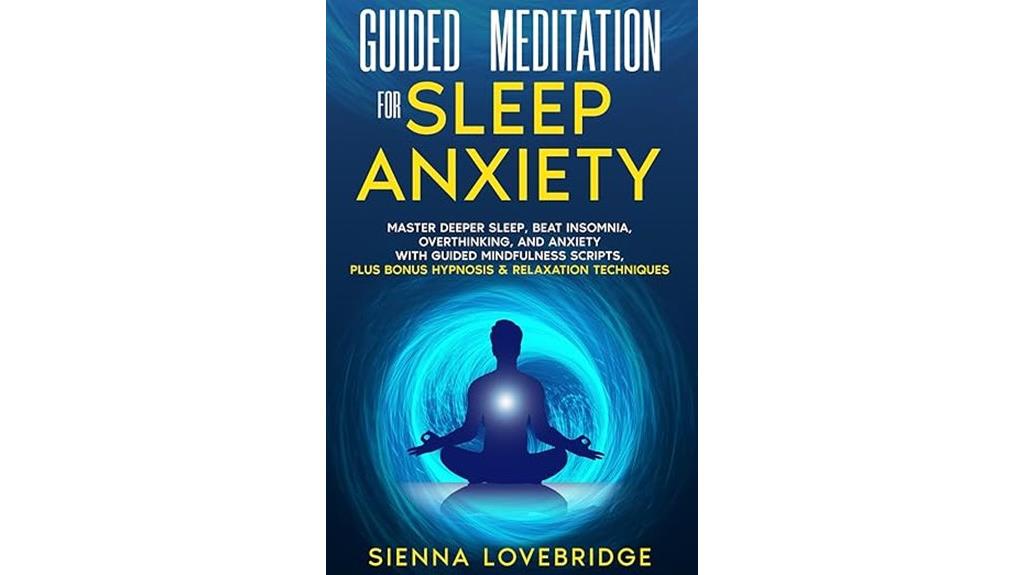
If you struggle with restless nights caused by racing thoughts or anxious feelings, Guided Meditation for Sleep Anxiety is an excellent choice. I’ve found that this guide offers practical techniques to calm your mind and release tension before bed. It combines mindfulness scripts, breathing exercises, and affirmations that target specific sleep challenges like overthinking and persistent worry. I appreciate how accessible the methods are, whether you’re a beginner or experienced meditator. By creating a soothing sleep environment and establishing calming routines, I’ve experienced more restful nights and waking up refreshed. This approach helps transform your relationship with sleep, fostering peace and relaxation naturally.
Best For: individuals experiencing sleep anxiety, racing thoughts, or insomnia who seek a natural, holistic approach to improve sleep quality and reduce nighttime stress.
Pros:
- Offers practical, easy-to-follow techniques suitable for beginners and experienced meditators alike.
- Combines mindfulness scripts, breathing exercises, and affirmations tailored to specific sleep challenges.
- Emphasizes creating a calming sleep environment and routines to promote restful nights naturally.
Cons:
- Some users may find it repetitive, as key concepts are reinforced throughout the guide.
- Exercises requiring focus might be challenging for those with very restless or wandering thoughts.
- Does not recommend specific products, which might leave some looking for more detailed product guidance.
Night Meditations Guided Journal for Restful Sleep
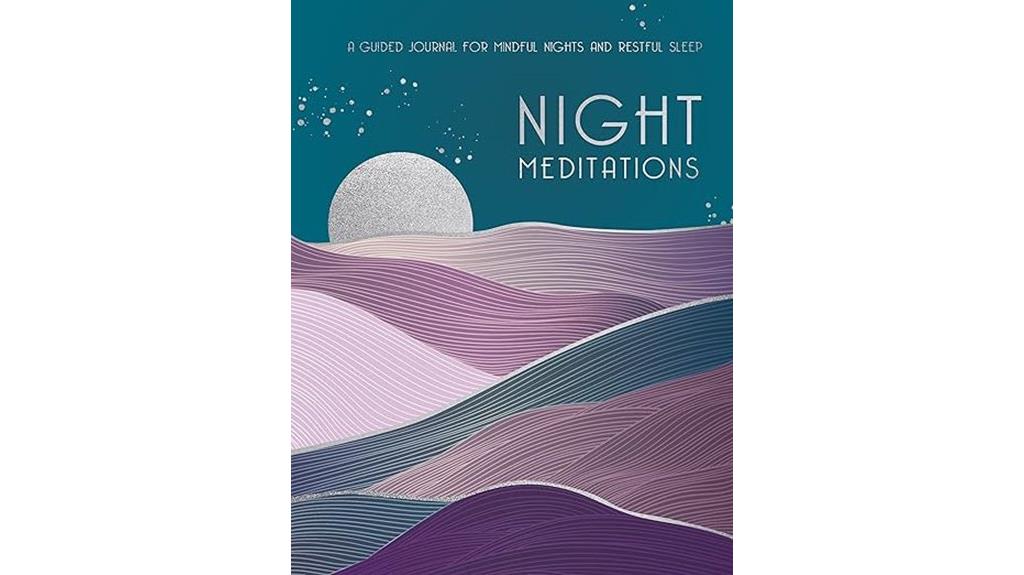
The Night Meditations Guided Journal for Restful Sleep is best suited for those who prefer reflective journaling over traditional meditation exercises to wind down at night. Its beautifully designed hardcover encourages mindful writing with soothing prompts that help process thoughts, emotions, and daily experiences. However, it’s more about reflection than meditation techniques, making it ideal for those who find calming through writing. Some prompts focus on negative thoughts and worries, which might not be suitable right before bed for everyone. Overall, it’s a thoughtful tool for cultivating calmness and mindfulness, but it may not replace meditation-focused routines for restful sleep.
Best For: individuals who prefer reflective journaling and gentle prompts to wind down and process their day before sleep.
Pros:
- Encourages mindful reflection and emotional awareness through journaling.
- Features a soothing, well-designed hardcover that is visually appealing.
- Offers a variety of prompts that can help foster calmness and self-awareness.
Cons:
- Contains prompts that focus on negative thoughts and worries, which may not be ideal right before sleep.
- Not a meditation guide and lacks specific techniques for meditation or relaxation exercises.
- May not be suitable for those seeking distraction-free routines or active relaxation methods for sleep.
Sleep Through Insomnia: End the Anxiety and Discover Sleep Relief with Guided CBT-I Therapy

Those struggling with chronic insomnia and persistent anxiety around sleep will find Guided CBT-I Therapy particularly effective. I’ve seen many readers turn their sleep around within just six weeks, often transforming restless nights into restful, deep sleep. The program emphasizes science-based techniques like sleep restriction, stimulus control, and sleep hygiene, helping you understand your sleep patterns and reduce anxiety. Personal success stories highlight how journaling and guided exercises can rewire your brain’s sleep signals. While it requires effort and discipline, the long-term benefits—better sleep, less worry, and a restored circadian rhythm—make it a powerful, practical solution for lasting relief.
Best For: individuals suffering from long-term insomnia and sleep-related anxiety seeking a science-based, non-pharmacological approach to improve sleep quality.
Pros:
- Uses evidence-based CBT-I techniques like sleep restriction and stimulus control to promote lasting sleep improvements
- Provides practical exercises, sleep journaling, and educational resources to empower users
- Suitable for a wide range of sleep issues, including complicating factors like sleep apnea and shift work
Cons:
- May require significant effort, discipline, and patience during the initial phases of the program
- Considered expensive for a relatively slim guide, and some may find the content basic or oversimplified
- Lacks the depth of professional therapy, which might limit its effectiveness for severe or complex sleep disorders
Deep Sleep Meditation Guide for Better Sleep and Relaxation
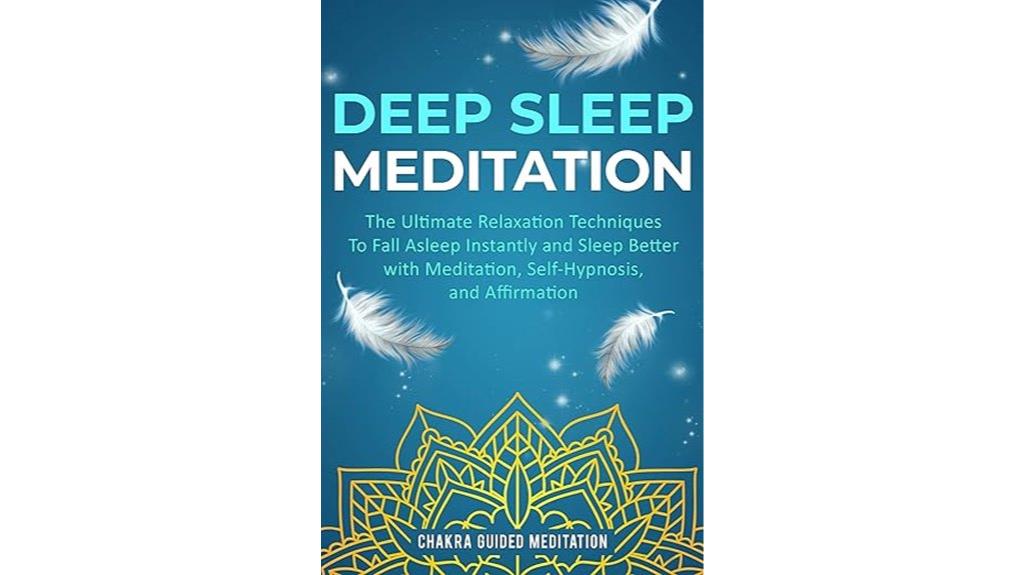
Anyone struggling to quiet a restless mind and fall asleep quickly will find the Deep Sleep Meditation Guide especially helpful. It offers simple, effective techniques like meditation, self-hypnosis, and affirmations to promote relaxation and improve sleep quality. I’ve personally found it incredibly effective—many users report falling asleep almost instantly after listening, especially when their minds are racing. The content is straightforward and accessible, making it perfect for beginners or experienced meditators alike. I appreciate its practical approach, and I’ve experienced more restful nights since incorporating these methods. It’s a reliable resource I highly recommend for better sleep and relaxed evenings.
Best For: individuals who struggle with restless minds or sleep issues and seek simple, effective relaxation techniques to improve sleep quality.
Pros:
- Easy to understand and accessible for both beginners and experienced meditators
- Combines effective methods like meditation, self-hypnosis, and affirmations for comprehensive relaxation
- Highly recommended by users for its proven ability to help fall asleep quickly and enjoy more restful nights
Cons:
- May require consistent practice to see long-term benefits
- Some users might find the techniques less effective if not practiced regularly
- Available primarily on Kindle and digital platforms, which may not suit those preferring physical books
The No-Nonsense Meditation Book
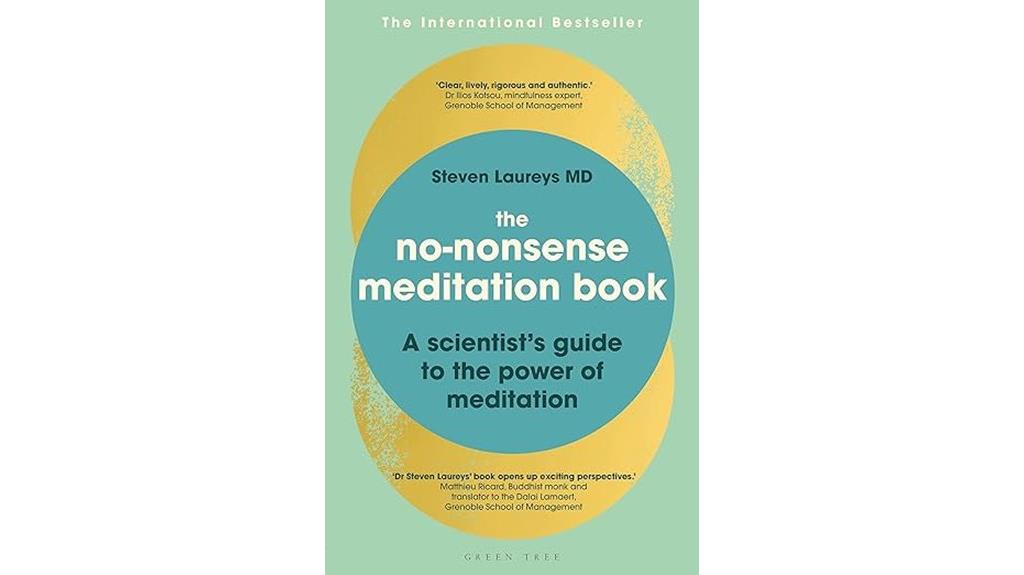
If you’re looking for a straightforward guide to improve sleep through meditation, The No-Nonsense Meditation Book delivers practical techniques grounded in scientific research. I found its simple breathing exercises—inhale, hold, exhale for four counts—especially effective for calming my racing thoughts and quieting my “monkey brain.” Steven Laureys presents meditation as a science-backed practice, making it credible and trustworthy. Despite some minor writing flaws, the book offers clear, practical advice and references for further learning. It’s perfect for beginners and seasoned meditators alike, providing a no-frills approach that demystifies meditation’s benefits and helps establish healthier mental patterns for better sleep.
Best For: beginners and experienced meditators seeking a straightforward, science-based guide to improve sleep and mental calmness.
Pros:
- Provides practical, easy-to-follow breathing techniques grounded in scientific research.
- Combines credible scientific insights with practical advice, appealing to skeptics and practitioners alike.
- Includes references and resources for further learning, supporting continued practice.
Cons:
- Contains minor grammatical errors and less fluid writing in some sections.
- Some readers may find the straightforward, no-nonsense style less engaging compared to more narrative-driven meditation books.
- Focuses primarily on sleep improvement, which might limit appeal for those seeking broader meditation applications.
Sleep Meditation Scripts for Insomnia (The Stillness Series Book 11)
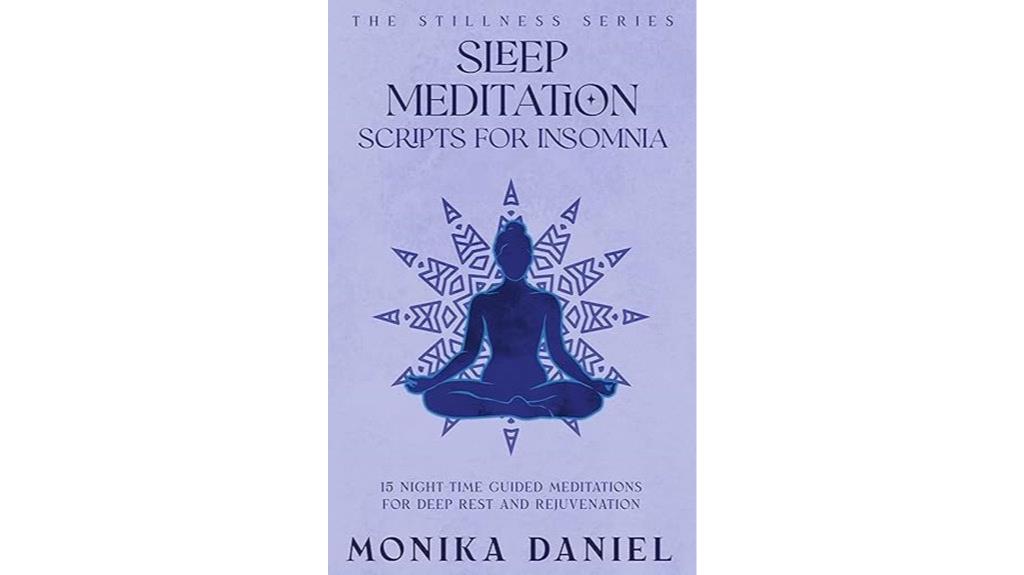
Sleep Meditation Scripts for Insomnia (The Stillness Series Book 11) is an ideal choice for individuals struggling to fall asleep due to racing thoughts or physical tension. I’ve found it to be a calming, practical resource that guides you gently into deep relaxation. With 15 thoughtfully crafted scripts, it helps quiet the mind and ease bodily tension, making it easier to drift off. The tone is warm and soothing, perfect for beginners or anyone seeking a peaceful night’s rest. Many users report quicker relaxation and more restful sleep, often pairing the meditations with soft background sounds for an even deeper calming experience.
Best For: individuals struggling with insomnia, racing thoughts, or physical tension who seek gentle, calming guided meditations to improve sleep quality.
Pros:
- Offers 15 thoughtfully crafted scripts tailored to promote deep relaxation and restful sleep.
- Suitable for beginners due to its warm, soothing tone and easy-to-follow guidance.
- Enhances relaxation when paired with soft background sounds or ambient music.
Cons:
- May require additional background sounds or music for optimal calming effect.
- Some users may find the scripts too gentle or repetitive if they prefer more active meditation techniques.
- The book is primarily audio-based, so those who prefer visual aids might find it less engaging.
Factors to Consider When Choosing a Sleep Guided Meditation Book
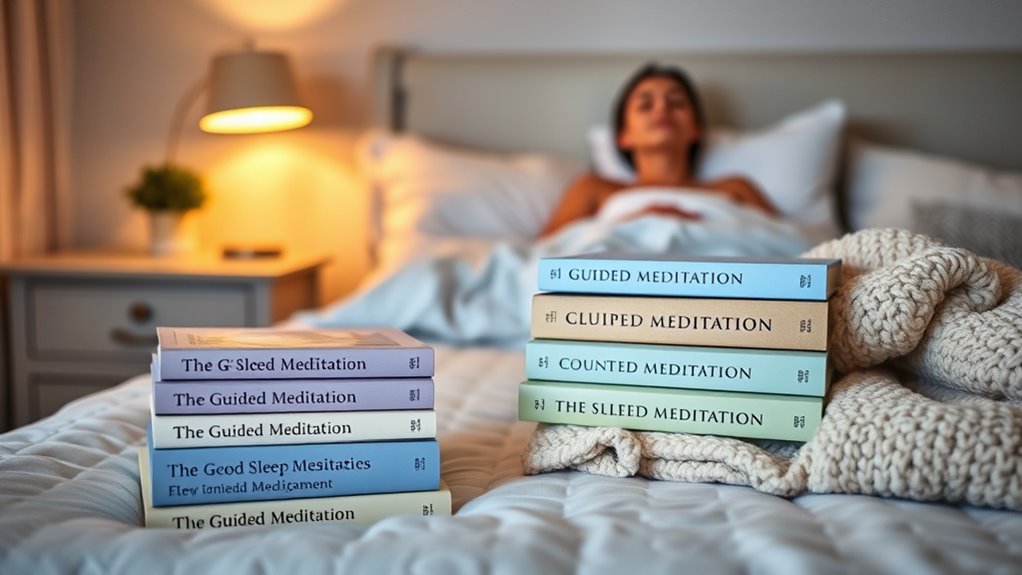
When choosing a sleep guided meditation book, I consider the meditation focus to match my needs, whether it’s calming anxiety or promoting relaxation. I also look for books that are easy to use and offer practical techniques I can quickly incorporate into my nightly routine. finally, I prioritize options that allow for some personalization, so the practice feels tailored to my preferences.
Meditation Type Focus
Choosing the right guided meditation book depends heavily on understanding the different types of meditation and how they target relaxation. For sleep, each type offers unique benefits. Mindfulness meditation helps by cultivating present-moment awareness, reducing racing thoughts that keep you awake. Guided imagery uses calming visualizations to detach your mind from stressors, easing you into sleep. Body scan meditations focus on progressively relaxing muscle groups, releasing physical tension that interferes with rest. Your personal preferences and specific sleep challenges should guide your choice. If your mind races at night, mindfulness might work best. If physical tension is your barrier, a body scan could be more effective. Selecting a meditation style that resonates with you increases the chances of making it a consistent part of your bedtime routine.
Ease of Use
Selecting a guided meditation book that’s easy to use is essential for establishing a relaxing bedtime routine. I look for books with clear, step-by-step instructions that are simple to follow, even if I’m new to meditation. The language should be straightforward, avoiding confusing jargon so I can focus on relaxing instead of deciphering instructions. Visual aids like diagrams or scripts are helpful, guiding me effortlessly through techniques. Accessibility features such as large print or organized layouts make it easier to find and follow sections quickly, especially when I’m tired or stressed. A practical book also offers tips for seamlessly integrating meditation into my nightly routine without extra tools or complicated setups. Ease of use guarantees I stay consistent and truly benefit from my bedtime meditation practice.
Content Depth
A well-crafted guided meditation book should offer in-depth explanations of sleep biology and related mental processes, helping me understand why certain techniques work. I look for thorough insights that demystify how sleep functions and what influences it, so I can better grasp the science behind the practices. The content needs detailed, step-by-step scripts or exercises that are easy to follow, ensuring I can practice consistently. It’s also essential that the book balances scientific explanations with practical application, catering to my needs to learn and implement effectively. Additionally, I value tailored approaches for specific issues like racing thoughts or anxiety, addressing my unique challenges. Finally, the material should suit my experience level, whether I’m a beginner or more advanced in meditation, to keep me engaged and progressing.
Practical Techniques
When evaluating guided meditation books for better sleep, I focus on the practicality of the techniques they offer. I look for clear, step-by-step instructions on breathing exercises, progressive relaxation, and body scans that help calm the mind. Techniques like guided imagery, affirmations, and self-hypnosis are especially useful for quieting racing thoughts and reducing sleep anxiety. The best books provide scripts that are easy to follow, suitable for both beginners and experienced meditators. I also consider whether the book suggests pairing meditations with ambient sounds or background music, as these can deepen relaxation. Most importantly, I prefer resources that emphasize consistency, encouraging a routine that integrates meditation into nightly habits for lasting sleep improvements.
Personalization Options
Personalization options play a crucial role in choosing the right guided meditation book for better sleep. I look for books that offer customizable scripts targeting my specific concerns, like racing thoughts or anxiety. Adjustable meditation lengths or audio recordings help me fit practice into my busy schedule. I also appreciate the ability to choose themes or guided imagery that resonate with me, such as nature scenes or calming routines. Some books include journals or reflection prompts, allowing me to adapt my practice based on my daily sleep experiences. Additionally, having access to different meditation styles—mindfulness, hypnosis, or progressive relaxation—lets me tailor techniques to how I respond best, making my sleep routine more effective and personally meaningful.
Audio vs. Text
Ever wonder whether listening to guided meditations or reading them suits you better for sleep? Audio options offer an immersive, real-time experience that can boost relaxation through tone, pacing, and voice cues. If you respond well to auditory cues, this might be your best choice. Plus, soothing background sounds or music can help mask environmental noise and deepen your calm. On the other hand, text-based meditations let you read at your own pace, pause, and revisit instructions whenever needed, giving you more control. They’re ideal if you prefer silent reflection or want to customize your environment. For those with visual or reading difficulties, audio can be more accessible. Ultimately, your personal learning style and comfort with each format will guide your choice between audio and text.
Scientific Backing
Research shows that guided meditation can markedly improve sleep quality by promoting relaxation and reducing stress hormones like cortisol. Scientific studies confirm that meditation decreases sleep latency and enhances overall sleep by fostering calmness and lowering anxiety. Evidence indicates that meditation alters brain activity, increasing alpha and theta waves linked to relaxation and sleep readiness. Randomized controlled trials demonstrate that regular practice reduces insomnia symptoms and nighttime awakenings. Neuroimaging reveals that meditation influences brain regions responsible for stress regulation and emotional processing, key factors in sleep disturbances. Additionally, empirical data shows that guided meditation boosts parasympathetic nervous system activity, creating a calm, restful state that helps you fall asleep naturally. These scientific findings underscore the importance of choosing books rooted in research-backed techniques for effective sleep improvement.
Cost and Value
Choosing a sleep guided meditation book involves balancing cost with the value it offers. Prices vary widely, from free online resources to premium printed guides, so it’s important to evaluate what you’re getting for your money. A higher price doesn’t always mean better content, so look for thorough, practical material that suits your needs. Check if the book provides a variety of techniques, like scripts, breathing exercises, or additional resources, to maximize its usefulness. Comparing the length and depth of content helps determine if the price is fair. Some books include bonus features such as audio files, worksheets, or supplementary guides, which can boost value and effectiveness. Ultimately, choose a book that offers the best balance of quality and affordability for your sleep improvement journey.
Frequently Asked Questions
Which Guided Meditation Book Is Best for Chronic Sleep Disorders?
I recommend “The Sleep Solution” by Dr. Chris Winter. It’s a practical guide that combines meditation techniques with scientific insights, helping those with chronic sleep disorders. I found his approach gentle yet effective, offering real tools to relax your mind and body. If you’re struggling long-term, this book provides a compassionate, accessible way to improve sleep quality, making it my top pick for persistent sleep issues.
Are There Specific Books Tailored for Children or Teenagers?
Did you know that nearly 20% of children and teens experience sleep issues? I’ve found some fantastic guided meditation books specially designed for them. These books use calming stories and gentle techniques to help younger minds relax and drift off peacefully. I recommend exploring titles like “Sleepy Time Yoga” or “Goodnight Mind,” which are tailored to kids and teens, making bedtime more soothing and enjoyable.
How Do Guided Meditations Differ From Traditional Sleep Aids?
Guided meditations differ from traditional sleep aids by actively engaging your mind through spoken instructions, visualization, and breathing techniques, helping you relax naturally. Traditional aids like pills or ambient sounds may offer quick relief but can have side effects or become less effective over time. I find guided meditations empower me to fall asleep peacefully, fostering long-term relaxation skills without dependency, making them a gentle, effective alternative.
Can Guided Meditation Books Replace Medication for Sleep Issues?
Can guided meditation books replace medication for sleep issues? Honestly, I’d say they might not fully replace prescribed meds, but they’re fantastic companions. I’ve found that calming my mind with guided meditations helps me fall asleep naturally, often reducing my dependence on sleep aids. It’s all about exploring alternatives and finding what works best for your body. Sometimes, a peaceful mind is the best medicine you can give yourself.
What Is the Average Time Needed to See Sleep Improvements?
I’ve found that most people start noticing sleep improvements within a week or two of consistent practice. I recommend dedicating at least 10-15 minutes daily to guided meditation. Keep in mind, everyone’s different—some see results sooner, while others take longer. Patience and regular practice are key. Stick with it, and you’ll likely experience better sleep quality over time as your body and mind adjust.
Conclusion
If you’re serious about transforming your sleep, these books are your secret weapons—your ticket to nightly bliss and waking up like a superhero! Imagine falling asleep faster than you can say “goodnight,” waking up refreshed, and banishing insomnia forever. Don’t settle for restless nights—grab one of these guides and unleash the sleep of your dreams. Trust me, your best sleep is just a page away—ready to change your life forever!










